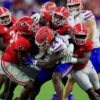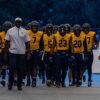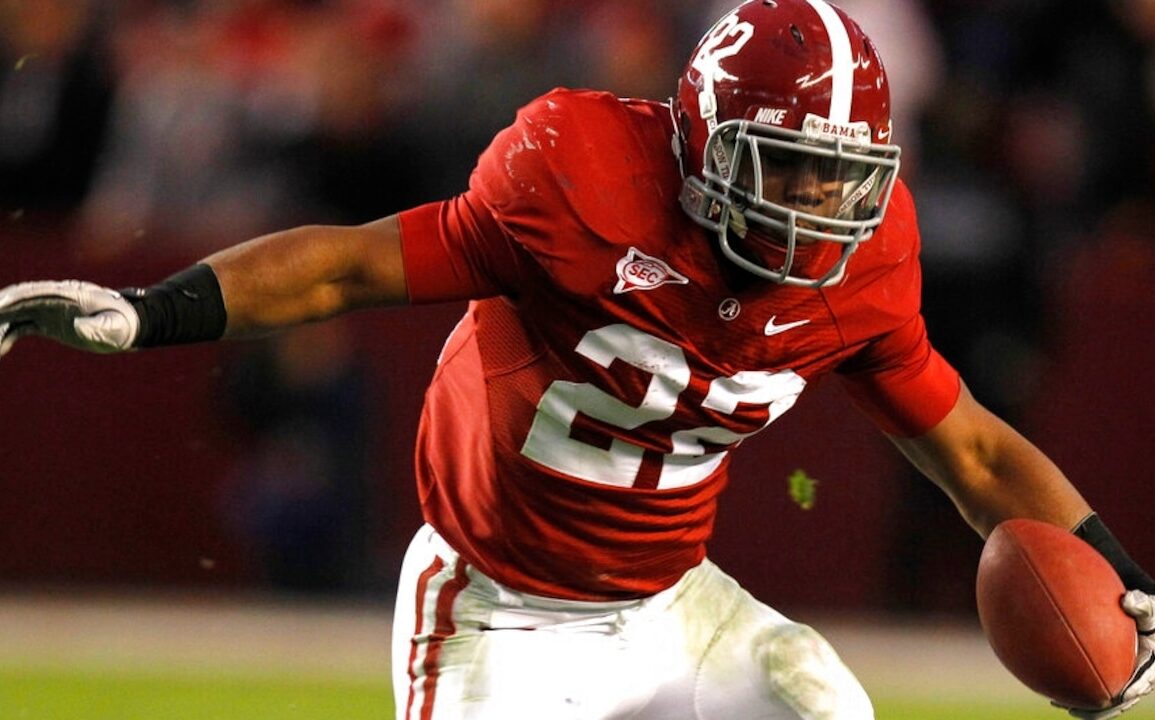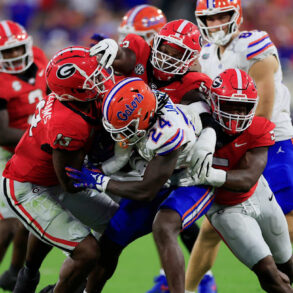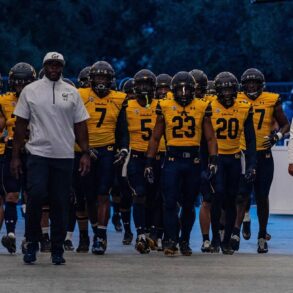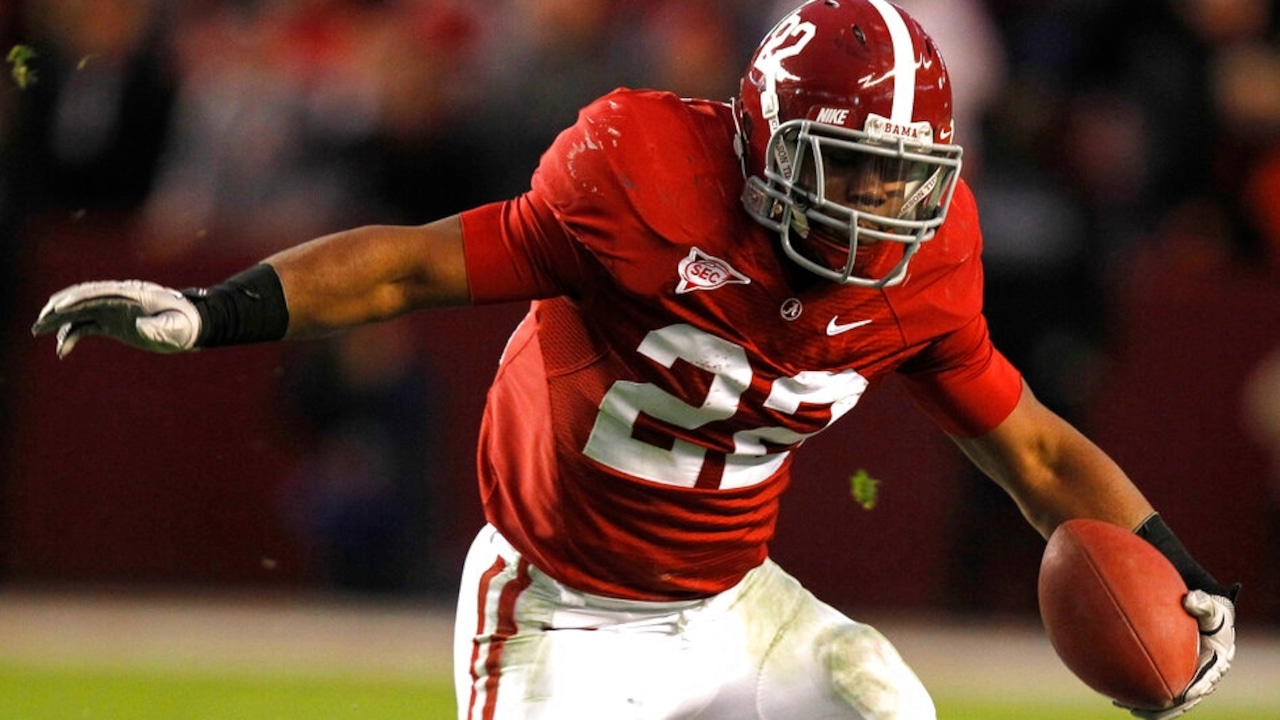
Two of the three SEC Heisman Trophy winners who are eligible for the College Football Hall of Fame but not enshrined are among the candidates for the Class of 2026.
Mark Ingram, Alabama’s 2009 Heisman Trophy winner, is making his second appearance on the ballot.
Cam Newton, Auburn’s 2010 Heisman Trophy winner, is on the College Football Hall of Fame ballot for the first time.
The SEC has produced 16 Heisman Trophy winners. Eight are in the College Football Hall of Fame. Five are not yet eligible. The one eligible SEC Heisman Trophy winner who has not made a ballot appearance is Texas A&M quarterback Johnny Manziel, the 2012 winner.
Ingram and Newton are among the 13 players and two coaches from the SEC who appear with 66 other players and seven other coaches on the NCAA FBS portion of the ballot.
The SEC coaches include Tommy Tuberville, who appeared on the ballot for the Class of 2025, and Dennis Franchione, who is making his first appearance among the candidates.
In addition to Ingram and Newton, the SEC players on the Class of 2026 ballot include:
- Florida defensive lineman Alex Brown
- Kentucky wide receiver Randall Cobb
- Florida defensive tackle Brad Culpepper
- LSU guard Alan Faneca
- Tennessee safety Deon Grant
- Florida wide receiver Percy Harvin
- Georgia running back Garrison Hearst
- Alabama linebacker DeMeco Ryans
- Tennessee wide receiver Larry Seivers
- Georgia defensive lineman Richard Seymour
- Auburn linebacker Takeo Spikes
Joining Newton as new to the College Football Hall of Fame ballot are Cobb, Grant, Harvin and Ryans.
SEC players who were on the 2025 ballot with Ingram and are back for 2026 include Brown, Culpepper, Faneca, Hearst, Seivers, Seymour and Spikes.
SEC players who were on the 2025 ballot but are not on the 2026 ballot include Tennessee wide receiver Willie Gault, Auburn guard Ed King, Ole Miss offensive lineman Michael Oher and Alabama offensive lineman Chris Samuels.
Also on the 2026 player ballot are Arkansas guard Leotis Harris, Oklahoma linebackers Rocky Calmus and George Cumby and quarterback Josh Heupel and Texas defensive tackle Casey Hampton from before their schools became members of the SEC.
SEE THE ENTIRE COLLEGE FOOTBALL HALL OF FAME CLASS OF 2026 BALLOT
After Auburn linebacker Gregg Carr, Tennessee defensive tackle John Henderson and Ole Miss offensive tackle Terrence Metcalf were picked for induction with the Class of 2025, the SEC has 107 former players in the College Football Hall of Fame.
Tuberville compiled a 159-99 record in 21 seasons as a head coach, including 14 in the SEC. At his first stop as a head coach, Tuberville went 25-20 at Ole Miss from 1995 through 1998. He moved to Auburn in 1999 and guided the Tigers to an 85-40 record over the next 10 seasons.
Franchione compiled a 213-135-3 record in 30 seasons as a head coach, including two in the SEC. Franchione went 17-8 as Alabama’s coach in 2001 and 2002.
Also among the nominated coaches is Jim Carlen, who guided South Carolina from 1975 through 1981, before the Gamecocks joined the SEC.
Detailing the Class of 2026 player candidates from the SEC:
Alex Brown, Florida, defensive lineman, 1998-2001: Brown had been a first-team All-American selection by the Walter Camp Football Foundation in 1999, then helped Florida win the SEC championship in 2000 and gained consensus All-American recognition as a defensive end in 2001. The three-time All-SEC selection set Florida’s single-season sack record with 13 in 1999 and holds the school career record with 33.
Randall Cobb, Kentucky, wide receiver, 2008-2010: Cobb is listed on the Hall of Fame ballot as a wide receiver, but that’s only part of what he did for the Wildcats. Cobb set an SEC single-season record for all-purpose yards in 2010 with 2,396, with 1,017 reception yards, 424 rushing yards, 219 punt-return yards and 736 kickoff-return yards. Cobb came to Kentucky as a quarterback and threw five touchdown passes, in addition to the 37 TDs that he scored, for the Wildcats.
Brad Culpepper, Florida, defensive tackle, 1988-91: A consensus All-American in 1991, Culpepper was a team captain for Florida’s SEC championship squad that season. In addition to his playing honors, Culpepper also received the Campbell Trophy as college football’s top scholar-athlete. His 47.5 tackles for loss are still a career record for Florida defensive linemen.
Alan Faneca, LSU, guard, 1995-97: Faneca already is a member of the Pro Football Hall of Fame after a 13-season NFL career that included six selections as a first-team All-Pro. At LSU, Faneca earned consensus All-American recognition in 1997, when he won the SEC’s Jacobs Blocking Trophy and earned all-conference selection for the second straight season.
Deon Grant, Tennessee, safety, 1997-1999: After helping Tennessee win the first BCS national championship in 1998 with five interceptions, including one in an overtime win against Florida and another against Mississippi State in the SEC Championship Game, Grant tied for the national lead with nine interceptions in 1999. That allowed him to complete his college career as a consensus All-American.
Percy Harvin, Florida, wide receiver, 2006-08: The three-time All-SEC first-team pick helped the Gators win the BCS national championship in the 2006 and 2008 seasons as a dual threat. In 2007, when Harvin became the first Florida player to reach 100 receiving and 100 rushing yards in the same game in a victory over Vanderbilt, he was a first-team All-American selection by The Sporting News at wide receiver. In 2008, the American Football Coaches Association selected Harvin as its first-team All-American all-purpose player.
Garrison Hearst, Georgia, running back, 1990-92: Hearst won the SEC Player of the Year Award and the Doak Walker Award as the nation’s best running back in 1992, when he ran for 1,547 yards and 19 touchdowns and finished third in the voting for the Heisman Trophy. His 126 points led the nation that season, and he earned unanimous All-American recognition.
Mark Ingram, Alabama, running back, 2008-10: Ingram ran for 1,658 yards and scored 20 touchdowns in 2009, when Alabama won the BCS national championship with an undefeated season and he became the first Crimson Tide player to receive the Heisman Trophy. Ingram also earned unanimous All-American recognition in 2009.
Cam Newton, quarterback, Florida 2007-08, Auburn 2010: Newton won the Heisman Trophy in a landslide in 2010, when he paced Auburn to an undefeated season and the BCS national championship. With 2,854 passing yard and 1,473 rushing yards, Newton broke the SEC single-season record for total offense while accounting for 51 touchdowns – 30 passing, 20 rushing and one receiving.
DeMeco Ryans, Alabama, linebacker, 2002-05: A Bessemer prep star, Ryans capped his four seasons with the Crimson Tide as the winner of the SEC Defensive Player of the Year Award and the Lott IMPACT Trophy, which is presented annually to college football’s top defensive player for his athletic ability and personal character. Ryans was a unanimous All-American selection in 2005.
Larry Seivers, Tennessee, wide receiver, 1974-76: A consensus All-American in 1975 and 1976, Seivers led the SEC in receiving in both seasons, catching 41 passes for 840 yards in 1975 and making 51 catches for 737 yards in 1976. When he left Tennessee, he was the Volunteers’ all-time leader in receptions and receiving yards.
Richard Seymour, Georgia, defensive tackle, 1997-2000: After becoming one of the two defensive linemen to lead a Georgia team in tackles for a season and earning All-SEC recognition in 1999, Seymour repeated as an all-conference pick and earned first-team All-American recognition from the American Football Coaches Association and the Walter Camp Football Foundation in 2000. Seymour played on four bowl-winning teams with the Bulldogs.
Takeo Spikes, Auburn, linebacker, 1995-97: A two-time member of The Associated Press’ All-American second team, Spikes was a first-team All-American for The Sporting News in 1997. Auburn played in the SEC Championship Game for the first time that season, and Spikes capped his career as the MVP of the Tigers’ 21-17 victory over Clemson in the Peach Bowl. Spikes made 331 tackles at Auburn.
To be considered for the College Football Hall of Fame today, a player must have been a first-team All-American selection by one of the organizations that the NCAA uses to compile its annual consensus All-American team.
Players aren’t considered for the College Football Hall of Fame until 10 years after their final season. They also aren’t considered while they are active professional players.
Players aren’t considered if their college careers ended more than 50 years ago either. Those players still can be considered for the College Football Hall of Fame, but their qualifications are examined by the Football Bowl Subdivision Honors Review Committee, bypassing the ballot.
Players on the College Football Hall of Fame ballot are nominated by athletic directors, head coaches and sports-information directors at National Football Foundation-member schools.
The FBS nominees are sorted geographically for eight District Screening Committees. The committee members vote on which players will represent their region on the ballot. Players who received significant support in the final voting in the previous year but did not make the College Football Hall of Fame also are held over on the ballot automatically.
Head coaches must have at least 10 seasons and 100 games of experience and a winning percentage of at least .600 to be considered.
More than 12,000 National Football Foundation and Hall of Fame voters received the ballot. The result of their votes will be considered by the NFF’s Honors Court, which will select the Class of 2026.
FOR MORE OF AL.COM’S COVERAGE OF THE SEC, GO TO OUR SEC PAGE
Mark Inabinett is a sports reporter for Alabama Media Group. Follow him on X at @AMarkG1.
This post was originally published on this site be sure to check out more of their content.


